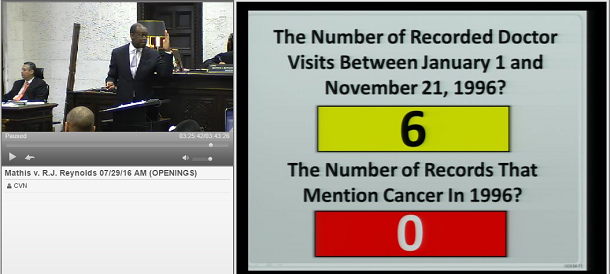
Ray Persons tells jurors Robert Mathis did not show symptoms of lung cancer until after the November 21, 1996 cutoff date for Engle class membership during openings of trial against R.J. Reynolds for Mathis's death.
Miami, FL—A Florida man who died of lung cancer after smoking 2 to 3 packs of cigarettes a day for nearly 50 years developed the disease after the bar date for filing a class action claim against the nation's tobacco companies, an attorney defending R.J. Reynolds said Friday in the trial's opening statements. Mathis v. R.J. Reynolds, 2007-CA-47118.
Robert Mathis had been a heavy smoker of menthol cigarettes since he began smoking in 1946 when he was about 15 years old. In 1995 and 1996, he reportedly suffered from a chronic cough, weight loss, and fatigue. But it wasn't until January of 1997 that dizziness and headaches revealed a brain lesion, which ultimately led to the lung cancer diagnosis. "Not all diseases qualify under Engle," said King & Spalding's Ray Persons, attorney for R.J. Reynolds, the defendant in Mathis's case. Persons told jurors Mathis went to the doctors at least six times in 1996 and allegedly showed no tell-tale symptoms of lung cancer before November 21 of that year. "Mr. Mathis was diagnosed with lung cancer on January 30, 1997. Mr. Mathis's treating physicians did not diagnose him with an Engle-qualifying disease."
Mathis's widow, Hazel Mathis, brought suit against R.J. Reynolds in connection with Engle v. Liggett Group, a 1994 class action lawsuit involving Florida smokers who successfully sued U.S. tobacco companies claiming the they knew they were producing dangerous, addictive cigarettes but hid it from the public. The Florida Supreme Court affirmed the jury's findings on but decertified the class. Plaintiffs must file their claims individually and prove the smokers at the centers of their cases suffered from nicotine addiction that caused a smoking-related disease. However, to fall within the ambit of the Engle class, a smoking-related disease must "manifest" itself before November 21, 1996. Mathis was diagnosed with lung cancer 71 days after that date.
Hazel Mathis's lawyer, William Wichmann, of the Law Offices of William J. Wichmann, focused on Robert Mathis's addiction to nicotine and this alleged helplessness against it. Because Mathis smoked 2 to 3 packs a day for nearly 5 decades, Wichmann notes, Mathis received 400 to 600 doses of nicotine daily.
"Robert was so badly addicted that, after he was diagnosed with lung cancer in the hospital in Miami, he asked his daughter to please wheel him out of the hospital so he could please have a cigarette. He needed to have that nicotine," Wichmann said. "To some people nicotine is highly addictive, and it is every bit as addictive as heroin or cocaine to some people."
Wichmann contended that's what the tobacco companies counted on.
"They knew people didn’t smoke because they liked it. They knew people smoked because the nicotine in cigarettes is a drug and it’s highly addictive," Wichmann said. "And they knew this—they said, 'happily for us, we’re selling a product that is both addicting and unique.' And that’s not going to be disputed. They knew if they ever stopped selling nicotine, they’d be out of business overnight."
Mathis reportedly tried quitting several times throughout the years, using a variety of remedies, Wichmann said, including the nicotine patch, gum, going "cold turkey," and even switching to cigars and pipes, but to no avail. However, family members who are expected to testify regarding Mathis's quitting attempts have foggy memories, Wichmann acknowledged.
Persons countered that Mathis knew the dangers of smoking and chose to smoke anyway, long after the dangers were public knowledge. "This case isn't about banning cigarettes. The United States made the decision a long time ago that cigarettes would be a legal product, and that it would be accompanied by a warning, and that people could make their own decisions about whether to use the product or not," Persons said. "This case isn't about whether they are dangerous—they are, whether they are addictive—they are, and whether they cause disease—they do. Despite knowing that smoking was dangerous, that it was addictive since at least the 1960s—at least, Mr. Mathis chose to continue smoking without ever making a serious attempt to quit."
Related information
William Wichmann, of the Law Offices of William J. WIchmann, represents Hazel Mathis.
Ray Persons, of King & Spalding, represents R.J. Reynolds.
Learn more about CVN's unrivaled tobacco litigation library.





